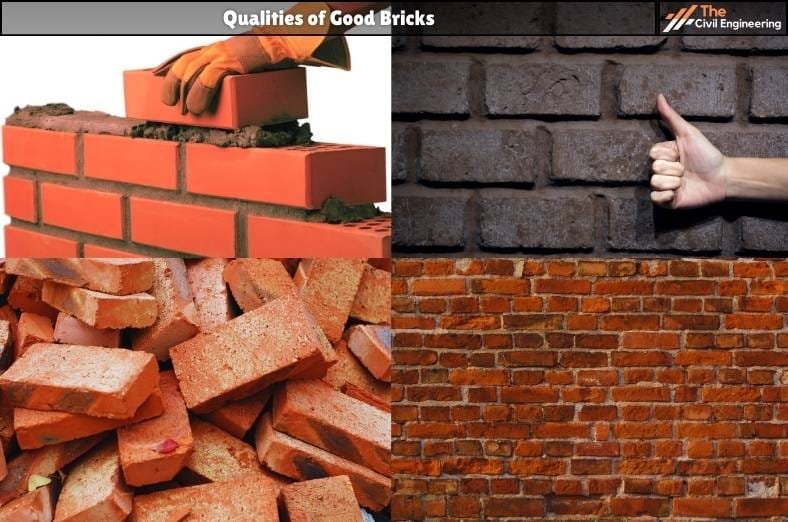The good bricks that are to be used for the engineering structures should possess qualities like hardness, durability, etc. Some qualities of good bricks are:
1. Qualities of Good Bricks
a. Size and shape:
A decent brick should be uniform in size (standard) and have rectangular plane surfaces with parallel sides and sharp straight square edges. Its surfaces shouldn’t be too sleek otherwise the mortar won’t stick on it.
b. Colour:
The bricks should be table-moulded, well burnt in kilns, coppery, free from cracks and with sharp and sq. edges.
The colour should be uniform and bright. Generally, the reddish/ copper-like colour is preferred.
c. Structure:
A decent brick should show fine, compact and uniform structure in a broken form.
d. Soundness:
A decent brick should provide a clear metallic ringing sound once stricken with another brick.
e. Hardness:
Brick should be hard enough and shouldn’t leave any impression on its surface when scraped.
f. Porosity:
Brick shouldn’t absorb more than 20% of its dry weight of water when kept immersed for twenty-four hours.
g. Strength:
A decent brick ought to have a minimum crushing strength of 10.5 N/ mm². Ordinarily, it shouldn’t break when dropped flat on the hard ground from a height of about 1 m.
h. Resistance to fire:
Brick ought to have adequate resistance to fire. Standard brick can resist temperature up to 1200° C. Bricks to be used for the lining of furnaces, etc., should be of special quality (known as fireplace bricks).
i. Efflorescence:
A good brick mustn’t contain abundant alkaline salts, which can cause efflorescence on its surface and decay the brick.
j. Durability:
Brick should be ready to resist the results of weathering agencies like temperature variations, rain, frost, action, etc.
2. Some Other Qualities of Good Bricks
The best quality brick is first-class brick. All quality bricks should show the same properties as first-class brick.
Such properties are:
a. It should be well burnt in kilns.
b. It should have sharp edges and a well-defined shape of standard size.
c. It should be hard and produce a metallic sound on striking two bricks.
d. Its surface should be smooth, clean, crack-free and compact texture.
e. Water absorption shouldn’t exceed 15% of its weight when immersed in water for 24 hours.
f. It should have low efflorescence on its surface when soaked in water for 24 hours and dried.
g. It should not leave marks on scratching with fingernails.
h. It should pose a uniformly reddish colour (copper colour).
i. It should have compressive strength not less than 100 kg/m² and not more than 125 kg/m².
j. It should have a minimum crushing strength of 105 kg/m² i. E 1500 Ibs per square inch.
k. It should not be broken when dropped from the height of (1-2) m.
l. It should have low thermal conductivity.
m. It should have a specific gravity of 1.8.
n. It should be weather-resistive to some extent.
o. Its weight shall not be less than 1100 kg/m³ according to (Standard Temperature Pressure) STP 7.8.
| Read More: Types of Brick Bonds |
| Read More: Surveyor Compass |

